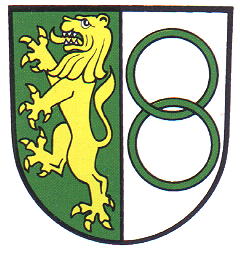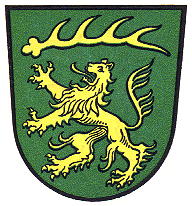Hettingen: Difference between revisions
Knorrepoes (talk | contribs) m (Text replacement - "{{de}}" to "") |
Knorrepoes (talk | contribs) m (Text replacement - "|'''English''' ↵| {{blazon wanted}}↵" to "|'''English''' | blazon wanted ") Tags: Mobile edit Mobile web edit |
||
| Line 17: | Line 17: | ||
|- | |- | ||
|'''English''' | |'''English''' | ||
| | | blazon wanted | ||
| {{blazon wanted}} | | {{blazon wanted}} | ||
|} | |} | ||
Revision as of 09:56, 7 April 2023
HETTINGEN
State : Baden-Württemberg
District (Kreis) : Sigmaringen
Additions : 1975 Inneringen
| German | (1952) In Grün unter einer liegenden fünfendigen goldenen Hirschstange ein goldener Löwe. | (1977) In gespaltenem Schild vorne in Grün ein aufgerichteter goldener Löwe, hinten in Silber zwei verschlungene grüne Ringe übereinander. |
| English | blazon wanted | No blazon/translation known. Please click here to send your (heraldic !) blazon or translation |
Origin/meaning
The present (above) arms were officially granted on October 6, 1977 after the merger with Inneringen.
Hettingen was first mentioned as a city in 1407 and the oldest seal dates from the same time. The seal already showed the above left arms. These arms showed the lion of the Counts of Gammertingen, who founded the town in the 12th century. Hettingen later became a possession of the Counts of Veringen. The deer antler is derived from the arms of the Counts of Veringen (see also Gammertingen).
The first coloured image is known since 1535, but the colours have been changed several times since. The present colours have been used since the middle of the 19th century and have been officially described in 1952 when the arms below were granted.
The new arms combine the lion from the old arms with the rings from Inneringen.
Literature: Stadler, 1964-1971, 8 volumes.

